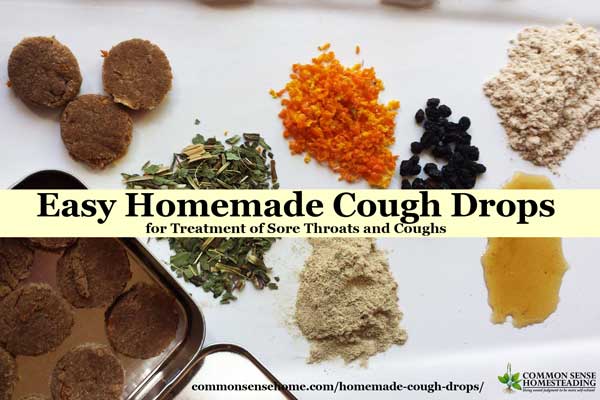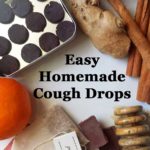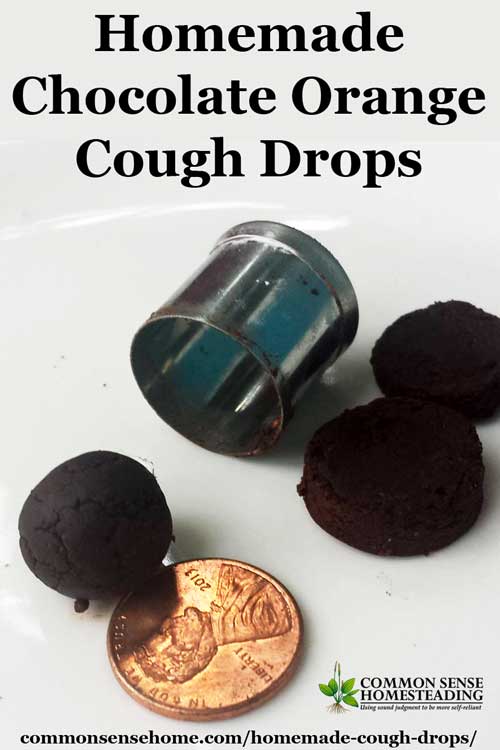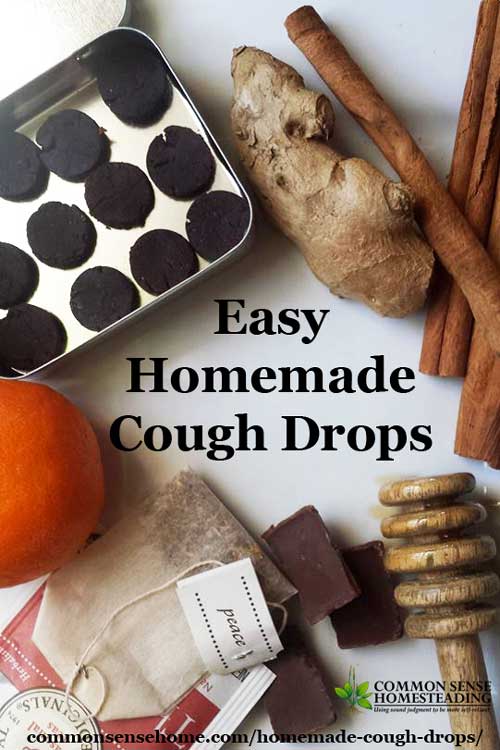Easy Homemade Cough Drops for Sore Throats and Coughs
This post may contain affiliate links. Read my full disclosure here.
You can learn to make your own homemade cough drops and avoid the toxic ingredients in the over the counter (OTC) medicines.
Whether you’re raiding the pantry looking for relief or an experienced herbalist, you can make these easy, all-natural throat soothing cough lozenges in just a few minutes – without any special tools.
It is helpful to have a dehydrator for quick, uniform drying, but you can also use the oven with the light on for gentle heat.

There are many recipes that heat ingredients to the hard crack stage to make a candy-like cough drop. I do not recommend making any herbal cough drops using this hard candy method.
Extreme heat damages the herbs so they lose their nutrient content and are basically rendered useless. Even heating honey to 160°F or above causes rapid degradation and decay.
Remember, anything strong enough to act as medicine may cause side effects and interfere with prescription medicines. Tell your doctor and your pharmacist before taking any medications. Because these drops contain raw honey, do not use for children under 2 years of age.
What’s Wrong with Commercial Cough Medicine?
OTC medicines may offer temporary relief, but they may interfere with other medications. They are filled with artificial and harmful ingredients such as :
FD&C Blue 2, FD&C Red 40, Flavors, Glucose Syrup, Soy Lecithin, Sucralose, Sucrose, Aspartame, Sodium Carboxymethylcellulos, Caramel, etc. (source)
As noted above, if you’re using a hard candy style herbal cough drop, you’re not getting the maximum benefit out of the herbs.
Chocolate, Orange and Honey for Colds, Coughs and Sore Throats
Dark chocolate fans will love these herbal cough lozenges made with common pantry items.
Cocoa doesn’t just taste good, it contains Iron, Magnesium, Copper, Manganese, Potassium, Phosphorus, Zinc, Selenium, Polyphenols, Flavanols and Catechins.
A small study by the Imperial College London found that theobromine in chocolate was more effective than codeine at suppressing the urge to cough.
Another larger study testing a cough treatment with a cocoa-based demulcent (product that coats and soothes) noted reductions in cough frequency, sleep disruption and improved health status. See ” Rococo study: A real-world evaluation of an over-the-counter medicine in acute cough“.
Honey possesses antiseptic and antibacterial properties. In medical studies, honey surpasses dextromethorphan and diphenhydramine as cough suppressants.
Vitamin C is an important vitamin and antioxidant that the body uses to keep you strong and healthy. Vitamin C is used in the maintenance of bones, muscle, and blood vessels. Vitamin C also assists in the formation of collagen and helps the body absorb iron.
Chocolate, Orange and Honey Cough Drop Recipe
Ingredients
- ½ Cup of Filtered or Distilled Water
- ½ Teaspoon Powdered Ginger
- 1 Teaspoon Cinnamon
- Orange Zest from one organic orange
- 2 Tablespoon Raw Honey
- 1/2 Cup Carob or Cocoa Powder, divided
- 2 Tea Bags of Herbal Tea – Cold Care, Throat Coat Tea or Other Herbal Cold Tea
Directions
- Bring water to boil and pour over tea bags and let steep until cool.
- Gently squeeze the water out of tea bags and reserve 2 tablespoons of tea. (You can drink the rest of the tea.)
- Mix together 2 tablespoons of tea, honey, cinnamon, ginger and orange zest.
- Add ¼ cup of cocoa or carob powder and mix.
- Add remaining cocoa powder 1 tablespoon, blending well after each addition. Continue until you can squeeze the dough in your hand and it keeps its shape.
- Form dough into small balls about ½” in diameter and place on cutting board.
- Press dough balls with your thumb and flatten out until about ¼” thick.
- Place lozenges in dehydrator at 95°F or in oven with oven light on. Dehydrate until completely dry.
- Store in airtight container, use as needed.
Easy Herbal Homemade Cough Drops
Ingredients
- 1-3 Tablespoons of Dried Herbs/berries/roots
- Filtered or Distilled Water
- Orange Zest from one organic orange
- 2 Tablespoons Raw Honey
- ½ Cup Slippery Elm Powder, divided
Directions
- Choose your herbs from the list below.
- Make your herbal decoction or infusion, cool and reserve 2 tablespoons of the resulting liquid.
- Mix 2 Tablespoons of herbal liquid, honey, and orange zest.
- Add ¼ cup of slippery elm powder and powdered herbs and mix until well blended. Note: Reduce amount of slippery elm powder by one teaspoon for every teaspoon of powdered herb you add to your recipe.
- Add remaining slippery elm 1 tablespoon at a time, blending well after each addition. Continue until you can squeeze the dough in your hand and it keeps its shape.
- Form dough into small balls about ½” in diameter by rolling in your hands and place on cutting board.
- Press dough balls with your thumb and flatten out until about ¼” thick. (Drops will shrink during drying.)
- Place lozenges in dehydrator at 95°F or in oven with oven light on. Dehydrate until completely dry.
- Store in airtight container, use as needed.
Top 8 Cold and Sore Throat Herbs
Every ingredient you use in your homemade cough and sore throat drops should serve a specific purpose. Herbs and spices produce actions in our bodies when we ingest them; understanding their actions will help us custom make lozenges that will treat our specific needs.
If you have a dry cough you will want to take something that will include an expectorant. If your cough is keeping you up at night you will want to add an herb that aids in sleep as well.
After you have chosen your herbs, you need to make an herbal infusion or an herbal decoction. Infusions and decoctions are different ways to get the good stuff from your herbs into water.
Would you like to save this?
Leaf herbs or flowers work better with the infusion method and roots, berries, barks and seeds work best with a decoction.
#1 Slippery Elm (Ulmus Rubra)
Slippery Elm is a Demulcent, Emollient, Expectorant, Diuretic, nutritive and mucilaginous herb with properties similar to comfrey.
#2 Elderberries (Sambucus Nigra)
Elderberries contain flavonoids, are antioxidants, antiviral, anti-inflammatory, antiviral, anti-influenza, and anticancer properties. Chemicals in the berries help reduce swelling in mucous membranes and relieve nasal congestion.
#3 Wild Cherry Root/Bark (Prunus Serotina)
Wild Cherry Root is analgesic, antibacterial, anti-constrictive, anti-inflammatory, and relaxing to the muscles. The bark is ½% hydrogen cyanide, just enough to stop the coughing and to relax the bronchial tubes.
#4 Cinnamon (Ceylon)
Cinnamon is a potent antioxidant, antifungal, antibacterial and is used to treat coughing and sore throats.
#5 Ginger (Zingiber)
Ginger is an antiseptic, decongestant, antiviral, anti-inflammatory, antihistamine, decongestant and a natural pain reliever. It contains chemicals called sesquiterpenes which are specifically used to target rhinoviruses (the most common family of cold viruses).
#6 Licorice (Glycyrrhiza Glabra)
Licorice is an anti-inflammatory, expectorant, soothing to gastric mucous membranes, cooling, and antiviral.
#7 Echinacea (Purpurea)
Echinacea contains active substances that boost immune function, relieve pain, reduce inflammation, and have hormonal, antiviral, and antioxidant effects.
#8 Marshmallow (Althaea)
Emollient, contains polysaccharides that have antitussive, mucilaginous, and properties. Because of this, marshmallow has a soothing effect on inflamed membranes in the mouth and throat when ingested orally, specifically sore throat. The antitussive properties help reduce dry coughing.
How to Make an Herbal Infusion
Hot infusions draw out vitamins, enzymes, and aromatic volatile oils from leaves and flowers. A few good herbs for hot infusions include Chamomile, Holy Basil, Ginger, Nettle, Peppermint, and Skullcap.
To Make an Infusion:
- Scoop 1-3 tablespoons of dried herb into a strainer.
- Heat 1 cup of water until it just comes to a boil.
- Place strainer in your cup.
- Pour hot water over herbs and cover to keep the essential oils from escaping.
- Steep for 15 minutes to 1 hour and strain.
How to Make an Herbal Decoction
Decoctions are simmered teas that are perfect for the extraction of hard roots, dried berries, barks, and seeds. Longer brewing time is needed to extract the medicinal compounds from these tougher plant materials.
To Make a Decoction:
- Place 3 tablespoons of dried herb into a small sauce pan.
- Cover the herbs with a quart of cold water.
- Slowly heat the water to a simmer and cover.
- Allow to gently simmer for 20 to 45 minutes.
- Strain the herb and reserve the tea in a quart jar.
- Pour additional hot water back through the herb in the strainer to fill your jar.
I hope you give these homemade cough drops a try and that you find them as helpful as our family does.
More Cough and Cold Care Tips
You may also find useful:
- The Best Vitamins and Minerals for Fighting Colds and Flus
- Stomach Flu Treatment (Why the BRAT diet may not be your best choice)
- 9 Home Remedies for Congestion
Do you have any cough and cold care tips? Leave a comment below.

This post is by Amber Bradshaw of My Homestead Life.
Amber and her family moved from their tiny homestead by the ocean in South Carolina to forty-six acres in the Smoky Mountains in East Tennessee.
While building their off-the-grid homestead, they live like the days of old – cooking without electricity, collecting water from the creek and raising chickens, goats, pigs, turkeys, bees, and guineas.
They’ve recently filmed their journey for a TV show on the Discovery Channel and the DIY Network/HGTV called Building Off The Grid: The Smokey Mountain Homestead.







I wonder how the these would do if freeze dried? I have a lifetime of struggling with dry mucus membranes and frequently have an irritated throat so I would like to make a bunch and store them but, if they turn into powder, it would just be wasted effort and food.
I haven’t tried freeze drying, but I think plain freezing would work better. I suspect they’d get crumbly when freeze dried. Dehydrating tends to shrink and firm up foods, while freeze drying maintains a stable shape and give a powdery texture.
Slippery Elm is also a laxative.
If you’ve never had it before I strongly suggest trying a small amount first and wait a couple days (or 30 minutes), to see how you react. Some people have strong adverse reactions to even a small amount. It can be rather unpleasant.
Signed – From Experience
Nice ideas. 🙂
Good to know. I didn’t have that type of reaction even when I’ve consumed a whole cup of slippery elm tea or used it in hot cereal, but everyone is unique.
Perfect timing! Cough drops are on the list to make so we have some in stock. I currently have to avoid all things rice, corn, wheat, and quinoa (it’s a royal pain in the, um, neck). Before this, I never would have guessed that rice syrup is in just about every brand of cough drop, including the small herbal brands. I’ve wanted to try making cough and sore throat drops for a couple of years and it looks like I’ll be checking that item off of my list this month.
Thanks for the great recipes – I can’t wait to try both of them.
Glad to be of help. I know it’s tough when you’re dealing with allergies, as many friends have foods they need to avoid.
Confused about the amount of tea used. You state to make a half cup. But you only use 2 tablespoons. What do you do with the rest of the tea?
We usually just drink it while making the drops.
?☕️thanks for clarifying
You’re welcome. I’ll update the post to make it more clear, too.
Love the cough lozenges recipe Laurie! Going to try them as soon as possible. Blessings in the new year and thanks for sharing.
Thanks, Jolee, and you’re welcome.
I love that recipe using the cocoa! I’m surprised not to see horehound in the list. It is easily grown and makes a traditional cough drop/syrup. I’ve been using horehound cough drops for decades. Mullien is another weed whose flowers make a fantastic cough syrup and it’s super easy to make. An added benefit of using slippery elm in the cough drop is that it soothes sore stomachs as well and helps prevent dehydration of the gastrointestinal lining – something that can easily happen while sick. Plus the stomach can be irritated from swallowing draining mucus and it helps alleviate that irritation. Also, elderberry seeds are toxic to humans. Dried elderberries still contain the seeds. I make my own elderberry syrup from dried elderberries and I take it every morning to prevent colds and flu, but even after mashing the cooked berries, the seeds have to be disposed of. On another note, an infusion is generally made using 1/2 to 1 ounce of dried plant material and steeped for 4+ hours. A decoction method is used to reduce the liquid by about half.
These are great recipes. I have shied away from making cough drops due to the “hard candy” method. Not great at making it, and as mentioned, it destroys many of the healing properties of many herbs and honey.
Thank you for the alternate method!!!
You’re welcome.